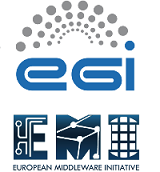Speaker
URL
http://www.eclipse.org/geclipse/ , http://www.eclipsecon.org/2009/sessions?id=336
Overview
Emerging Cloud infrastructures offer new ways to develop dynamic services. Management, provisioning and interoperability are the main challenges among others. Within the Eclipse community, there is a clear trend from the desktop usage to a general runtime system. With the help of the Eclipse eco system (www.eclipse.org) already today a toolbox of solutions exist to develop new services. The Equinox runtime of Eclipse - based on the OSGi standard - can be seen as the basis for an interoperable Cloud platform in the future.
An introduction to the various Eclipse projects will be given and an distributed search applications will be set up on Cloud resources (AWS or/and Eucalyptus) during the talk.
Description of the work
Emerging Cloud infrastructures offer new ways to develop dynamic services. Management, provisioning and interoperability are the main challenges among others. A short time-to-service is important to all kind of applications on Grid and Cloud infrastructures. With the help of the Eclipse eco system already today a toolbox of solutions exist to develop new services. As the underlying technology is based on standards (JAVA and OSGi) the application is independent from the underlying infrastructure.
This talk will explain the overall picture of OSGi applications on the Cloud. Furthermore it will demonstrate the set up a search application in the Cloud including the management of the Cloud, the dynamic provisioning of the application itself and the provisioning of a advanced AJAX based user interface on the Cloud. This will be performed with the help of the following Eclipse projects:
* g-Eclipse will be used to manage and configure the virtual Cloud resources based on its general Cloud model. Access to Eucalyptus and AWS resources is supported today.
* p2 will be used to deploy the search application.
* SMILA (SeMantic Information Logistics Architecture) is an extensible framework for building search applications for data like office documents, emails, images, audio & video files, blogs etc. One of the features of SMILA is the parallelization of processes/workflows, so the natural deployment environment of SMILA is similar to the distributed environment of the Cloud.
* RAP will be used to create a simple search user interface for the application based on JAVA script and AJAX technologies.
This talk demonstrates existing goodies from various Eclipse projects which can help to build Cloud applications independent from underlying infrastructures. It will show the potential power of Eclipse technology on the Cloud.
Conclusions
The setup of distributed OSGi-based application and the management with an integrated user frontend is possible today. The combination of existing Eclipse technology helps to build a full Cloud service stack including IaaS, PaaS and SaaS layer.
Impact
The Eclipse community is one of the biggest Open Source communities worldwide with strong support from industrial players. In an Open Community process the important trends for the next year were defined and they contained amongst others:
* Cloud and browser-based delivery of applications is the future.
• Cloud and browser-based developer tools need to support this future process.
* ...
The demonstration will show already today what is possible with existing Open Source technology in this area. An alternative approach for dynamic service delivery will be shown.

